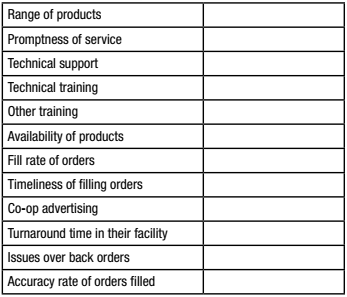 As contractors we understand how important it is to have a solid relationship with our customers. We see it as a win/win relationship. We get the repeat business at fair prices and they get good reliable service at fair prices. This relationship generates a lot of goodwill value in our business and those customers are the ones who are likely to give us the best referrals and give us opportunities to price their work and don’t insist that we be the low bidder. The relationship is based on trust and on value. It increases the value of our business. It improves our closure rates on bids. Customers that are always complaining about price and who use different providers are of little value to our businesses. It costs a lot in time and money to service them; therefore, we tend to give them a lower level of service and priority and if we don’t then they use up our energy and resources that should be going to our best customers. Our “A” customers should the best treatment because they are so important to the sustainability of our business. They are our lifeline.
As contractors we understand how important it is to have a solid relationship with our customers. We see it as a win/win relationship. We get the repeat business at fair prices and they get good reliable service at fair prices. This relationship generates a lot of goodwill value in our business and those customers are the ones who are likely to give us the best referrals and give us opportunities to price their work and don’t insist that we be the low bidder. The relationship is based on trust and on value. It increases the value of our business. It improves our closure rates on bids. Customers that are always complaining about price and who use different providers are of little value to our businesses. It costs a lot in time and money to service them; therefore, we tend to give them a lower level of service and priority and if we don’t then they use up our energy and resources that should be going to our best customers. Our “A” customers should the best treatment because they are so important to the sustainability of our business. They are our lifeline.
How about your relationship with your suppliers? Is that based on trust and value or just on price?
It is equally important to have a solid relationship with at least one major supplier. As contractors, we face a myriad of decisions that require a broad base of expertise. Very few contractors have the resources within their company to provide that expertise. It is critical for the success of your business to build alliances not only with your customers but with suppliers, subcontractors, and employees. Your business model should be based on having all these alliances in place.
There are numerous elements that make up a successful relationship with a supplier. You should review this and ensure that you are getting all those benefits and taking advantage of them.
Obviously getting good prices is critical. You need to stay competitive. But don’t sacrifice the other elements of the relationship over a few pricing issues.
Technical support and technical training are critical so your sales staff, project managers, and technicians can service your customers effectively. Are you getting this support from your supplier? Is your supplier offering sales training or customer service training? Are you sending your team to all the training offered? Insulation is offered in a very wide market segment from residential and commercial to industrial and institutional. Also the products are used in very diverse climates Parts of British Columbia rarely go much below freezing while most areas of the country have much greater extremes of temperature. The right technical support can ensure that the customer gets the best products to suit his situation with the lowest life-cycle costs.
Your customers need choices. They can’t all afford the more expensive systems with all the bells and whistles; many need less expensive options. Can you, in concert with your supplier, provide these alternatives to meet your customers’ needs? The supplier with the widest range of products and best technical support is going to be the easiest to deal with as you don’t have to shop around for products or knowledge.
Incentives: What incentives do suppliers offer for you to use them as your preferred provider? Do they extend good credit terms? Do you get special discounts if you buy in bulk? Do you get priority on products that are in short supply? Do they have a co-op advertising program, and if so, do you take maximum advantage of it?
Just like you wouldn’t want your customers picking you because you are the cheapest option, don’t you pick your suppliers and other support people on price alone. There is a difference between value and price.
Your customers, whether residential, commercial, institutional, or industrial, all want the same four outcomes:
• They want products and services that meet their needs.
• They want work completed in a timely manner.
• They want to stay within budget.
• They want to develop an ongoing relationship with their providers to ensure they get good after-sales service and guidance for future projects.
It is meeting these four outcomes that will keep them coming back to you. And you want the same from your providers.
No one contractor can have all the elements in-house to achieve these four outcomes. Building up your team of employees, sub-contractors, and key suppliers that focus on your needs allows you to focus on your customers’ needs and gives you the opportunity to win and retain customers. The right relationship with the right supplier can reduce your stress and increase your profits. Spend time building and maintaining that relationship.
Make a list of all elements that are important to you and review with your suppliers. Pick the supplier that best meets your overall needs—grade them on a points system to ensure you are getting the best outcomes for your business.
Here is a sample checklist you could use. Add any elements that are important to you.
Supplier matrix
Score each 1 to 5, 5 being best



